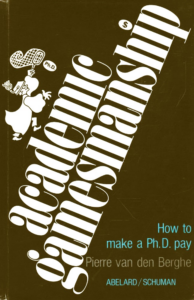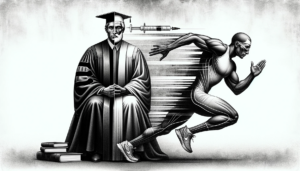David Tomar just published, through AcademicInfluence.com, a book titled The Complete Guide to Contract Cheating in Higher Education. Tomar was for a decade an academic ghostwriter, writing term papers that students would then turn in as their own work. Contract cheating goes beyond ghostwriting by doing the full range of coursework for students, everything from take-home exams to discussion board posts to, of course, ghostwritten papers.
Tomar announced his exit from a life of contract cheating with his 2010 article for The Chronicle of Higher Education titled “The Shadow Scholar.” He wrote this article under the pen name Ed Dante (which has a Wikipedia entry on the strength of that article — few people have Wikipedia entries for their pen names). It was the most trafficked and commented on online article in the CHE’s history.
***
I’m including here a helpful five-star Amazon review by my colleague Brian Carlson:
The Most Important Book on Reforming Higher Education in a Decade
Reviewed in the United States on July 14, 2022 | Verified Purchase
As an adjunct philosophy professor, I was always worried about whether my students were cheating. I had so many papers to grade, and I knew I could not give every paper the time it deserved. I worked very hard to do so, even as I saw my colleagues barely pay any attention to student assignments. So this book not only confirmed my experience, but showed me that the problem was bigger than I thought.
This book is the definitive text on academic ghostwriting (writing papers for students that they turn in as their own work) and more generally on contract cheating (which includes not just ghostwriting of papers but also impersonating students on course discussion boards, taking exams for them, etc.). In fact, I would go further and say this may be the most important book on education reform written in the past decade because it shows the negligence that allows this cheating to happen. I closely follow the Chronicle of Higher Education and Inside Higher Ed, and have never seen something this revelatory.
This book was a pleasure to read. Tomar is clear, insightful, and witty. There’s so much that is simply fun to read in this book, especially Tomar’s personal experiences as a ghostwriter and his detailed analysis of what makes it so entrenched in higher education.
After I read this book, I looked for other works by the author. I was shocked to find that Dave Tomar was a contract-cheater whistleblower. He even has a Wikipedia page devoted to “Ed Dante,” a pen name he used when he said goodbye to contract cheating in his 2010 tell-all article for the Chronicle of Higher Education titled “The Shadow Scholar.” I really appreciate the courage it took for him to whistleblow and to continue to try to expose the problems created by contract cheating.
I didn’t know that conventional plagiarism is pretty much dead these days because of services like Turnitin, which can check papers against other papers online and determine to what extent there was copying of existing texts. But in contract cheating, new text is created on the fly for an individual cheating student, so there’s no way to detect it simply by itself.
There are many takeaways from this book. One of the biggest is that contract cheating isn’t so much an ethical issue as a systemic dysfunction in American higher education. The saddest lesson that I took from this book is that contract cheating would largely disappear if teachers actually knew their students and what they are capable of. Both students and educators are set up to fail when they are in classes with hundreds of students.
I discussed Dave Tomar’s book with a colleague who shared the following exchange with an education professor commenting on Tomar’s book (I’m paraphrasing in places):
“In my masters and doctoral classes, even in an online format, I still get close enough to my students to know what an original piece from them looks like. Besides the academic papers, I run a discussion board where I’m also very much in there interacting back and forth with class members. When you find informally that their writing is weak, then we immediately go to the carpet when I get a ‘sterling’ essay. However, many professors are so aloof from their students, as they burnish their academic reputations, that they read very little of the student work submitted, and then pass out grades like candy.”
My friend is lucky enough to have manageable class sizes. But many professors (mostly adjuncts) are forced to teach large classes with no support. My friend puts his finger on where Tomar’s book will do the most good for American higher education, namely, in encouraging (requiring?!) professors to know their students and giving them the support to do so. This means universities need to remove barriers like ridiculously large class sizes while at the same time reprimanding professors who still fail to engage. Greater personal involvement in this way will keep students and faculty accountable for exhibiting real academic achievement (and not merely the appearance of it).
Yes, contract cheating needs to be stamped out. But as Tomar notes throughout his book, contract cheating is a symptom. The root cause behind it lies much deeper, and centers on the disconnection between faculty and students, and an unwillingness for all parties in the educational transaction to hold each other accountable (and that includes administrations that enable contract cheating through their policies).
Online education is particularly vulnerable to contract cheating. Not only are online students in a better position to put on a “cloak of invisibility,” but online schools, because of the premium they put on scalability, ramping up the sheer numbers of students, want, as a matter of policy, to keep students happy and coming back for more. The type of scrutiny and accountability that puts an end to contract cheating may seem unappealing to programs that prosper by everyone being able to coast.
***
In closing, let me relate a joke that I heard decades ago. It captures for me the core problem that Tomar exposes so effectively. Here’s the joke:
A student takes the final in a large class of several hundred. The teacher makes clear that when the bell rings, all students must hand in their finals or else they get a zero. The bell rings and everyone except this one student drops the exams off on the desk in the lecture hall where the exam was given. The teacher is seated at the desk and begins to grade the exams. Our one students decides to take his time and spends an extra 20 minutes on the exam.
Finally, the student comes down and tries to hand in the exam. The teacher, incensed, tells the student that there’s no way he’ll accept his exam. Indignant, the student responds, “Yes, but do you know who I am?” The teacher replies, “I don’t care who you are; you are getting a zero on this exam.” The student asks again, with still greater intensity, “Yes, but do you know who I am?” The teacher responds, “I don’t care if you’re the king of Siam, you’re still getting a zero on this exam.” A third time the student asks, this time shouting, “Yes, but do you know who I am?” To which the teacher replies, “Frankly, I don’t know who you are and I don’t care.”
At this point, the student lifts up the stack of exams on the desk, inserts his own exam into the stack, and walks out of the lecture hall.
LESSON: There may be benefits to teacher ignorance and apathy, but not for advancing education.


